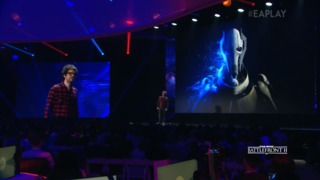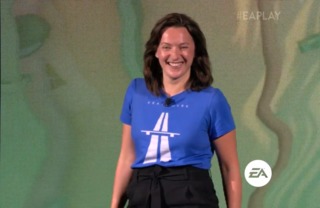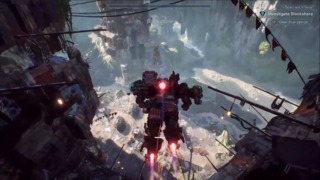E3 2018: EA
By gamer_152 2 Comments

Navigating art and entertainment means being critical of it and being critical of E3 means not just reviewing the press conferences as they are streamed but also looking at how accurately the press conferences of the past portrayed the products and services they were selling. If we don't stay diligent about this, it allows these companies to sell us a bill of goods every E3. I thought EA's press briefing last year was solid, but we uncovered some bitter truths about many of their games after the fact. Most notably, Need for Speed: Payback and Star Wars Battlefront II which debuted to positive reception at the time turned out to be tarnished by coercive and underhanded microtransaction systems. In the case of Star Wars Battlefront II, some onlookers were quick to declare all forgiven once DICE announced that they would remove lootboxes from the game, but that didn't change that the game's progression system was still designed to make players grind their way to satisfaction. What we needed to hear is that Battlefront II was going to be worked into something more than a skinner box with Stormtroopers and that EA wasn't going to pull this trick again.

To their credit, this year, EA DICE announced such a redesign for Battlefront II and admitted that their original implementation of paid content was a misstep. The respective developers of Battlefield V and Anthem also confirmed during this conference that their titles won't use non-cosmetic lootboxes. EA CEO Andrew Wilson did announce some charitable contributions the company would be making, and I saw a number of people insisting that this was a ploy to lift some of the heat they'd gotten for the recent microtransaction fiasco, but EA's "Play to Give" initiative was also part of the 2017 press conference so that can't be the full story. Although, that's not to suggest that their charitable efforts were altruistic rather than self-serving or that we're out of the woods re: EA's unscrupulous business transactions. You can bet that the mobile Command & Conquer they announced will have its microtransaction systems biting into its supposedly strategy-driven play. It's also not as if we haven't seen again and again that one terrible EA practice, even when downplayed or discontinued after a few years, isn't replaced by another. In the past, we've been mad at EA for shuttering beloved studios, for online passes, and for DRM. Right now we have a bone to pick about lootboxes, but I wouldn't be surprised if in three years it was something else entirely. The prevailing view has been that all these problems arise because EA is greedy, but every one of the companies putting on these conferences answers to a board of shareholders working in their own financial interests. It is not a unique fault of EA that the company is self-serving. What's unique is that the methods they've found to self-serve are frequently more anti-consumer than those of other companies.
EA is no doubt acutely aware that the lootbox debacle had people once again identifying them as the quintessential greedy video game business, and not only was their denouncement of lootboxes a reaction to that, but it's likely that their use of so many developers-as-presenters was as well. There was almost no executive presence on their stage this year; instead, EA fronted the conference with people who visibly cared about the medium, not the profit, and from that created the impression of a company who feel the same way. You could see this best during the presentations of Unravel 2, Sea of Solitude, and Anthem. You can also see how far this humbleness and earnestness go when you compare these demos to the Command & Conquer: Rivals spot or EA's showcasing of their Madden NFL champion. The attitude of a flustered but impassioned Cornelia Geppert couldn't be further from the "shoutcasters" selling us a mobile RTS. You can say you cringed at Vince Zampella's bizarrely delivered bit on Respawn's new Star Wars game, but there is an authenticity in his fumbling that the comparatively contrived C&C demo didn't have. He was also enthused to talk about how cool his game was whereas the Madden segment was more about how cool we were meant to think this one player was, a hefty gold champion's belt slung over his shoulder.

But let's not get deluded. It's possible for a developer to be both truthful about their visions and plans for a game and for them to be wrong about how the final product is going to look. With a game like Unravel 2, it's easier to verify the claims of the developer. Unravel 2 is a co-op game that has players not just performing tasks in the same space but seemingly acting directly on each other in that space to achieve their goals, and that's what good co-operative play entails. You can check whether the game delivers on that because you can go and buy it right now. But then I kept seeing people saying they were bowled over by what EA showed us of Sea of Solitude and that's an together more difficult topic because they didn't really show Sea of Solitude. We got to hear Geppert's reflection on the inspirations for the game, and we got to see a trailer for it, but haven't we been misled about the quality of a game based on more? Are claims about a game 100% accurate because they come from a creative director in a Kraftwerk shirt rather than a manager in a suit?
I don't say this to try and stop anyone delighting in the enthusiasm of Cornelia Geppert, Martin Sahlin, Vince Zampella, or the Bioware representatives at the show. What I mean is that motivation and joy from a developer are valid in themselves but are not necessarily a reflection on the work they're producing. Similarly, even if someone makes a video game that isn't entertaining or thought-provoking, that doesn't mean that love didn't go into it, nor does it mean the emotions the creators of those games have about them are in any way invalidated. To have respect for the creative process means acknowledging creators' love of their work as beautiful beyond it just being a way to get a product we'll have fun consuming. We can enjoy these artists' hype for its own sake, but we shouldn't confuse it with a guarantee that their game will be everything they or we want it to be. In fact, the final title of the conference brought to mind an old game about which many promises were made, but few were kept.

The Bioware shooter, Anthem, bears a striking resemblance to Bungie's Destiny. It's not just that they're both sci-fi FPS-RPGs being published by industry big dogs; Anthem's character design is comparable to Destiny's, both games have exultant orchestral soundtracks, they both have highly organic alien environments, they're both being presented with the suggestion of an extensive run of post-launch content, and both are games which apparently have a rich lore pulsing under the surface even when it's hard to see how they will efficiently convey it. It's also there in the jargon Bioware has invented for Anthem: In-universe terms like "song" and "anthem" would be right at home in Bungie's planet-hopping loot-'em-up. It didn't help that the presentation of the game was all backwards, as EA brought us an interview with the developers before showing us the play itself. The interview was played like it was contextualising content, but there was nothing to contextualise before they previewed the actual game. Why do I care about character customisation if you haven't yet connected me to a character? Why would I want to know what the name of the antagonists if I have no handle on the story they're participating in?
The parallels between Anthem and Destiny have left much of its potential audience eyeing it suspiciously, and it's going to be hard for Bioware to live up to expectations on this one. Their plan for Anthem is ambitious, and absolute separation between story and gameplay has not served other studios well. But to offer some counter-arguments, it was not a certain art style or a desire for mountains of backstory that doomed Destiny, and so there's no reason it should tank Anthem. It's not as if the premise and aesthetics behind Destiny are cursed; as best we can tell, Destiny's production just fell apart. Could we still get burned with Anthem the way we did with Destiny? Of course, but this isn't an Anthem or a Destiny problem. Instead, it's a down to how the intentions behind any game may not translate into results. And that should be what we keep in mind when thinking about the promises of the EA press conference and all of these press conferences. There's nothing wrong with being excited about E3, I'm stupidly excited about E3, but when thinking about this press conference or any other, we should remember games can be something altogether different than what we're pitched, no matter the creative intent behind them because that's what happened to Destiny, that's what happened to Need for Speed: Payback, and that's what happened to Battlefront II. Thanks for reading.